News
Buhari, others mourn Joda, who dies at 91, buried in Yola

Tributes have poured in for an elder statesman, Alhaji Ahmed Joda, who died on Friday at the age of 91 and has been buried.
The retired federal permanent secretary passed on at the Federal Medical Centre, Yola, Adamawa State.
He was buried at the Yola cemetery in accordance with Islamic tradition.
He is survived by four children, among them a humanitarian, Asma’u Joda, Bilkisu, Aliyu and Abubakar.
Abubakar Joda described his father as a statesman who sacrificed everything to make Nigeria great.
“He was a father to most Nigerians; therefore, the loss is quite universal. We have received calls from virtually all over the world. He loved Nigeria more than anything. He was an astute man, very straightforward and did all his best at any time,” he said.
President Muhammadu Buhari described Joda as a hero.
In a tribute to the last surviving member of the cabinet of late Governor Hassan Usman, Buhari said that even in death, Joda “will continue to inspire every generation to move forward with love, brotherhood and harmony.”
In a statement issued on Friday by his media aide, Garba Shehu, Buhari highlighted Joda’s contributions to Nigeria’s unity and progress.
He prayed to Allah to accept his good deeds and grant fortitude to those he left behind in his family, the Adamawa Emirate Council and the entire people of the state to bear the loss.
Also paying tribute to the late Joda, former President Olusegun Obasanjo described him as a great Nigerian who was committed to unity, development and progress of the country.
In a statement by his special assistant on media, Kehinde Akinyemi, Obasanjo noted, “If every Nigerian had the attributes of Joda, Nigeria would have been better than what it is now.”
He noted that Joda and other “super permanent secretaries” preserved the unity of Nigeria shortly after the country’s upheaval in 1966.
Joda was the chancellor of Bells University, Otta, and had about 60 years of friendship with Obasanjo.
Former Vice President Atiku Abubakar also described Joda as a colossus and an iroko tree in Nigeria and the North.
Atiku said he received the news of his death with shock though he lived to a prime age. He noted that the former permanent secretary was among the first generation of people who put Adamawa State and the North on the map of modern Nigeria.
“Ahmed Joda, with few of his peers, wrote the rule book of Nigeria’s civil service. His footprints will remain indelible.
“As we mourn this great Nigerian with immense contribution to the growth of our country, we pray that the Almighty Allah accepts his soul and provides his family with the fortitude to bear the loss,” he stated.
An elder statesman, Tanko Yakasai, also described the late Joda as a very dedicated Nigerian and a national hero.
Governor AbdulRahman AbdulRazaq of Kwara State has described the death of Joda as the “end of a great era,” calling him one of the best public administrators in the post-independent Nigeria.
In a condolence message on Friday, the governor hailed the former NCC chairman as a patriot with sterling records of integrity and service to the nation.
“He belonged to the generation of Nigerians who gave their all to birth a greater country.
“His death is painful. It is a personal loss to me as one of his ‘adopted sons’ and protégées,” Abdulrazaq added.
Secretary to the Government of the Federation, Boss Mustapha, expressed sorrow over the death of Joda.
In a statement by his media aide, Willie Bassey, on Friday, Mustapha described the death of Joda as a personal loss as he derived inspiration and guidance from his wise counsel in the execution of government’s activities.
He recalled his sterling contribution in 2015 when he was appointed the chairman of the Presidential Transition Committee, which led to a successful transition.
The SGF also mourns the passing away of Hajiya Hadiza Shagari, the widow of the late former president of Nigeria, Alhaji Shehu Shagari. He described the matriarch as a humble and dutiful wife.
He sent his condolence to the government and people of Adamawa and Sokoto states, the Sultan of Sokoto, and their families, praying God to grant the deceased Al-Jannah Firdaus.
Also, Abubakar Joda described his father as a statesman who sacrificed everything to make Nigeria great.
“He was a father to most Nigerians; therefore, the loss is quite universal. We have received calls from virtually all over the world.
“He loved Nigeria more than anything. He was an astute man, very straightforward and did all his best at any time,” he said.
The driver to the deceased in the last 41 years, Ahmed Ja-Allah, described his late boss as calm, caring, straightforward, hard working and honest.
“He hated corruption and bribery. Workers’ welfare was always his priority. As soon as it was 30th day of the month, he would not relent until every worker was paid,” he said.
A condolence message by the chief press secretary to the Adamawa State governor, Ahmadu Fintiri, Humwashi Wunosikou, eulogised Joda as an epitome of discipline and integrity.
A journalist, Abdullahi Tasiu Abubakar said, “Ahmed Joda was a well-respected elder statesman who was greatly admired, not just in his home state of Adamawa but throughout the country. He was simple, straightforward and honest.
“I remembered when I interviewed him in Yola several years ago; he was frank in his discussion. He was a man with great ideas on many issues: education, agriculture, sustainable development and so on. If his ideas had been used, Nigeria would not have been witnessing the herders-farmers clashes that are now bedevilling the country.”
Born in 1930, Joda had his early education at Yola Elementary and Middle School before proceeding to the Barewa College to complete his secondary education in 1948. He worked briefly at Moor Plantation in Ibadan.
Having received journalism training at the Pitsman College, London in the 1950s, he got his first journalism job at Gaskiya Corporation, Zaria, before his subsequent appointment as the editor of the Nigerian Broadcasting Commission in Kaduna.
He joined the northern Nigeria civil service as chief information officer and rose to become a permanent secretary before moving to Lagos in 1967 to become a federal permanent secretary.
He was one of the powerful civil servants known as super permanent secretaries in the 1970s, who played an important role during and after the Nigerian civil war.
After the war, Joda was seconded to the Ministry of Education to help undertake the rehabilitation of facilities in the old East-Central region. That was also the time the ministry was in the process of establishing the Nigerian Universities Commission (NBC) and involved in the launch of the Universal Basic Education.
Former President Olusegun Obasanjo appointed Joda on the Presidential Policy Advisory Committee headed by General Theophilus Danjuma (retd).
In 2015, the incoming President Muhammadu Buhari entrusted Joda with the chairmanship of the 18-member transition committee that coordinated the transfer of power from the outgoing President Goodluck Jonathan to Buhari. Earlier in 1979, he chaired the transition committee when General Obasanjo handed over power to the civilian government of President Shehu Shagari. He was also the permanent secretary of the Federal Ministry of Industry.
Joda served as chairman and member of several governments and private bodies, including the National Communications Commission (NCC), the Nigerian National Petroleum Corporation (NNPC), the Pastoral Resolve, SCOA Nigeria, LNG and the Nigeria Flour Mills.
He served as chairman of the Board of Trustees of the American University of Nigeria, Yola.
News
FG screens Fani-Kayode, Femi Pedro, others for ambassadorial posts, Reno Omokri missing
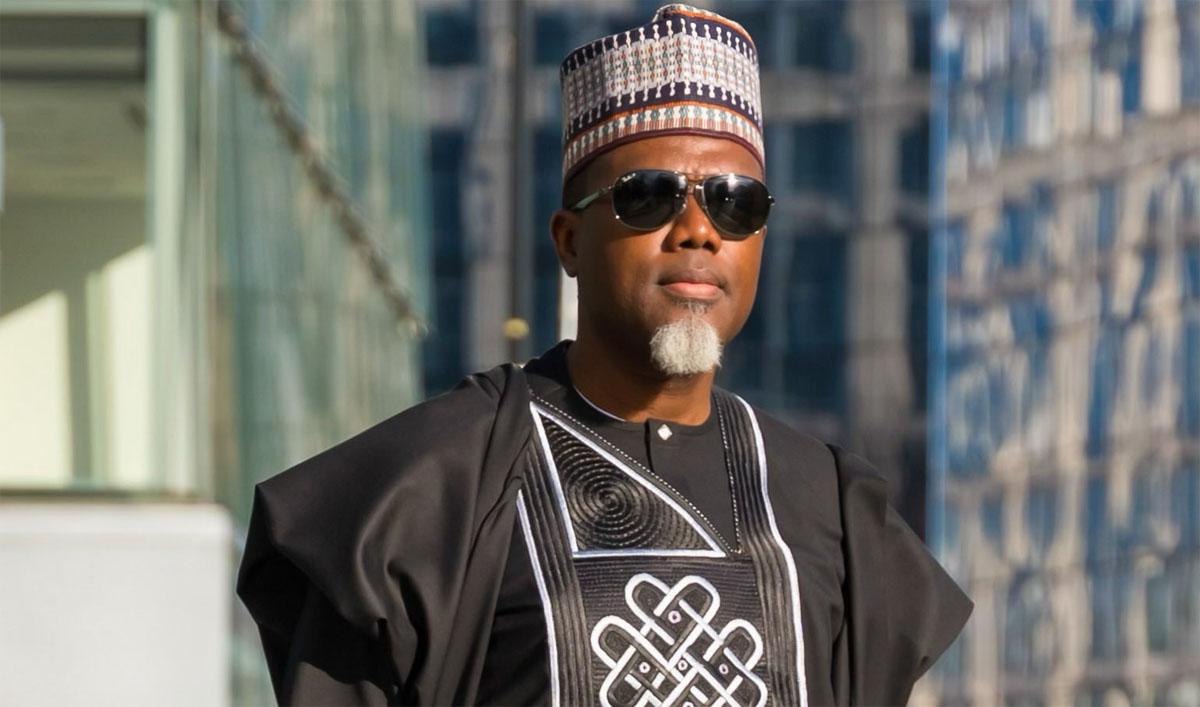
FG screens Fani-Kayode, Femi Pedro, others for ambassadorial posts, Reno Omokri missing
The Federal Government has begun vetting candidates for ambassadorial postings across its 109 diplomatic missions, including 76 embassies, 22 high commissions, and 11 consulates.
According to a report by Punch, credible sources revealed that former Aviation Minister Femi Fani-Kayode and former Lagos State Deputy Governor Femi Pedro are among the individuals undergoing screening.
The paper revealed that the process is being carried out through regional offices of the Department of State Services (DSS), rather than through a centralised mechanism.
Presidency officials confirmed that nominees have been contacted and asked to submit personal, educational, and professional records.
“They’re already doing security checks with DSS. When they have cleared security checks, we will release the list. Only those who have been cleared are announced. The process is ongoing. I know that we should have a list before the end of this month (April),” an official disclosed anonymously.
Another source stated, “The vetting is not done centrally. It is based on the location of the nominees. Nominees have been reached to provide personal history and information such as where they attended school, what appointments they have held, and the like. So, it is by location.”
READ ALSO:
- Israel admits mistakes over medic killings in Gaza
- I’m holier than you, Lizzy Anjorin tackles gospel artiste Tope Alabi
- Death of pregnant woman denied hospital care worries Lagos govt
Since September 2023, President Bola Tinubu has operated his foreign policy built on the “4Ds”—Democracy, Development, Demography, and Diaspora—without confirmed ambassadors in place. That same month, he recalled more than 83 ambassadors, both career and political.
In December, sources said the President spent part of his holiday reviewing nominees for diplomatic assignments with plans to send a consolidated list to the National Assembly. However, the process was delayed in January due to financial constraints.
One presidency insider said the delay was largely due to the estimated $1 billion required to settle outstanding obligations including the arrears of foreign service staff, renovations, and vehicle replacements.
“You see, the major issue is money. Not money to pay them [ambassadors], because how much is their salaries and benefits? The main money is CAPEX [Capital Expenditure]. By the time they put the cost together to fix the issues, it is running to almost $1bn.
“Most of those embassies, almost 90 per cent, are rundown. Either the residence is not good, the embassy does not have a functional office, or their rent has expired… I understand that some of them don’t have serviceable vehicles… Some of them don’t even have power and running water,” the source explained.
Foreign Affairs Minister Yusuf Tuggar has also blamed the delay on lack of adequate funding.
“It is a money problem,” Tuggar said during a May 2023 ministerial briefing in Abuja. “There is no point sending out ambassadors if you do not have the funds for them to even travel to their designated countries and to run the missions effectively… Mr President is working on it, and it will be done in due course.”
READ ALSO:
- Ancelotti laments after Valencia beat Real Madrid
- Jose Mourinho banned for three games, fined $7734
- Fuel prices to fall as global cost of oil falls
Although the 2025 budget includes provisions to address some of the issues, insiders say the funding is insufficient.
While the complete list of ambassadorial nominees remains classified, officials confirmed that several prominent figures are undergoing screening.
“They’re going to announce the appointments soon. They are being screened as we speak… FFK [Femi Fani-Kayode] is on the list. These are some of the controversial names that have been put forward as well. Then there is Fola Adeola [co-founder of Guaranty Trust Bank] and Femi Pedro too. They’re moving on with the process more quickly this time,” a source said.
According to another official, the rigorous screening is intended to ensure none of the candidates pose reputational or security risks to the country.
There were speculations that former presidential aide Reno Omokri had been shortlisted, but a source in the presidency dismissed the claim.
“Reno is not on the list. But FFK is there,” the source said.
Presidential adviser Bayo Onanuga confirmed that the list will include both career and political nominees and will undergo multiple layers of review before submission to the legislature.
“Don’t forget that the ambassadorial list has two components. There are career ambassadors and political ambassadors. The foreign affairs list and the consolidated list will still go through certain processes before they are released,” he said.
Two individuals believed to be among the nominees declined to comment when contacted. They neither confirmed nor denied their inclusion.
FG screens Fani-Kayode, Femi Pedro, others for ambassadorial posts, Reno Omokri missing
News
I didn’t collapse, says Wike, warns death rumour mongers
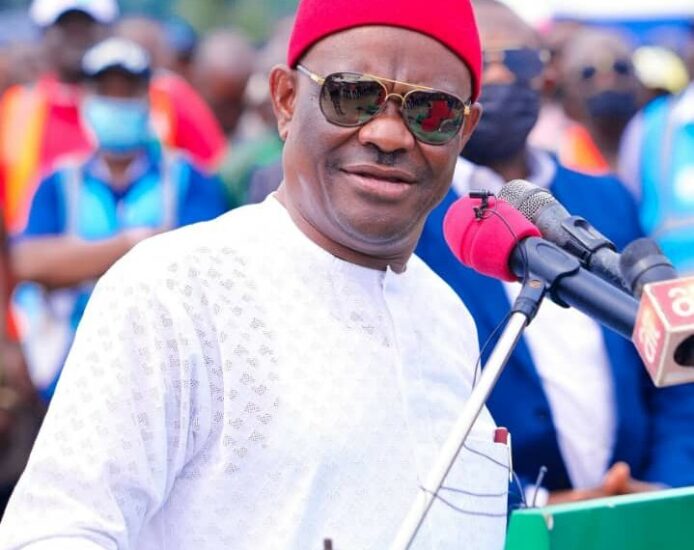
I didn’t collapse, says Wike, warns death rumour mongers
Minister of the Federal Capital Territory, Nyesom Wike, has debunked reports that he collapsed and was rushed to the hospital last week.
Wike described the reports of his rumoured collapse as the handiwork of “baseless” people trying to score cheap political points.
He spoke after inspecting four ongoing projects in the FCT, including the International Conference Centre.
Online posts circulating on X had surfaced alleging that the minister collapsed at an event on Friday in the FCT.
The rumour also claimed that Wike was immediately rushed to an undisclosed hospital, where he received treatment.
Reacting, Wike said, “There was no time I collapsed, there was no time anybody took me overseas. But you see me every day. The day Mr President broke iftar on his birthday, I was there.
“The next day, I led Abuja residents to pay Sallah homage. I see all those stories just died down. This is politics. We have thick skin. Those things don’t bother us. We are not distracted. We are focused on our jobs.
“So, I thank Nigerians for being worried, which should be, but people should not wish their fellow human beings such a thing to happen.
“We know that we will die one day. Nobody will remain in this world forever, but it is only God that says the day you will die, not any human being to say you will die today or you will die tomorrow.
“So, you have seen that I am even healthier than most of them who carried that rumour and I will write their condolence letters. I can assure you that I will write their condolence letters.”
News
World Bank approves Tinubu’s $632m loan request

World Bank approves Tinubu’s $632m loan request
The World Bank is poised to approve $632 million in new loans to Nigeria today (Monday), amid growing concerns over the country’s expanding debt profile.
The loans are intended to support important sectors such as nutrition enhancement and quality basic education.
According to data obtained from the World Bank’s website on Sunday, the two loans scheduled to be approved today are $80 million for the Accelerating Nutrition Results in Nigeria 2.0 initiative and $552 million for the HOPE for Quality Basic Education for All programme.
Both projects are now in the negotiating phase and are likely to gain final clearance later today.
These new loans are part of the World Bank’s overall strategy to support Nigeria’s development agenda, which focuses on healthcare, education, and community resilience.
The loans will support the government’s efforts to improve nutrition and education for Nigerian children.
Additionally, the World Bank approved a $500 million loan for Nigeria’s Community Action for Resilience and Economic Stimulus Programme on March 28, 2025, a significant step towards addressing the country’s economic challenges through expanded access.
The initiative, formally known as the NIGERIA: Community Action (for) Resilience and Economic Stimulus Programme, is intended to give critical support to households impacted by economic downturns while also strengthening community resilience.
The initiative focuses on vulnerable populations, providing assistance to households and small companies to help them cope with economic difficulties.
READ ALSO:
- Okada rider allegedly stabbed to death by wife over money
- Police rescue two persons abducted in Lagos
- Miyetti Allah accuses Benue community of poisoning 20 cows
The loan clearance is likely to considerably boost Nigeria’s efforts to revive the economy through grassroots backing, especially given current issues such as inflation and high living costs.
The stimulus plan will prioritise enhancing food security and developing economic possibilities for the populations most affected by recent economic changes.
This decision came after a delay in distributing funds for a previous loan aimed at poor and vulnerable Nigerians.
Further investigation by The PUNCH revealed that the World Bank disbursed around $315 million to Nigeria from the $800 million allocated for the National Social Safety-net Program Scale Up.
Nigeria is yet to receive further funding from the World Bank for this loan project, which was approved in December 2021. The delay in grant release is most likely due to fraud detected under the initiative.
In honour of the 2023 International Day for the Eradication of Poverty, President Bola Tinubu unveiled a social safety net programme that will distribute N25,000 to 15 million households over the course of three months.
The Federal Ministry of Humanitarian Affairs and Poverty Alleviation was responsible for managing the $800 million World Bank loan initiative.
However, due to allegations of embezzlement, the federal government was forced to stop the cash transfer program for further investigation and reform.
Betta Edu, a former humanitarian minister, was previously suspended for misappropriating N585 million set aside for palliative care distribution.
READ ALSO:
- Wike’s aide slams Atiku, says it’s too late to buy integrity
- Reps Committee recovers N21.4bn from four oil companies
- West African juntas impose levy on imported goods ECOWAS nations
Furthermore, Sadiya Umar-Farouq, Edu’s predecessor, was under investigation by the EFCC. The former minister is being investigated for allegedly laundering N37.1 billion during her stint as minister.
The World Bank also imposed sanctions on people and businesses discovered to be engaging in fraud under the initiatives.
According to the World Bank’s official website, this will bring Nigeria’s total approved loans to $9.25 billion over three years, indicating a growing reliance on multilateral funding to support critical sectors of the economy such as infrastructure, healthcare, education, and financial resilience.
A review of Nigeria’s World Bank loan approvals since 2023, under President Bola Tinubu’s government, reveals a huge rise in funding commitments.
In 2023, the World Bank approved $2.7 billion in loans for renewable energy, women’s empowerment, education, and the power sector. In 2024, funding approvals totalled $4.32 billion for various projects.
This increase was largely due to Nigeria’s growing need for financial assistance to stabilise the economy amid fiscal pressures and rising public debt.
Under President Bola Tinubu’s administration, the World Bank granted around 11 different credit projects for Nigeria.
In less than two years, the federal government has acquired loans from the World Bank totalling $7.45 billion, raising concerns about the mounting debt burden. According to data from the Debt Management Office, the World Bank’s portion of Nigeria’s external debt is $17.32 billion as of the third quarter of 2024.
The International Development Association is owing the majority of this debt, which amounts to $16.84 billion, or 39.14 per cent of Nigeria’s total external debt.
The International Bank for Reconstruction and Development, another World Bank subsidiary, is owing $485.08 million, or 1.13 per cent.
While the planned World Bank loans may give much-needed budgetary relief, concerns persist about the country’s mounting debt burden.
According to recent data from the Central Bank of Nigeria, the country has spent $5.47 billion servicing external debt in the last 14 months, underscoring the strain on its foreign reserves.
World Bank approves Tinubu’s $632m loan request
-
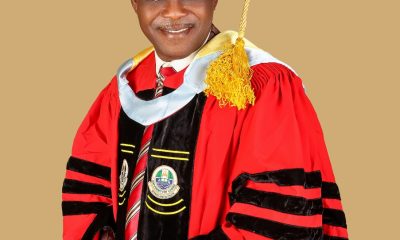
 Education1 day ago
Education1 day agoErudite mass comm lecturer Oscar Odiboh becomes full professor at Delta State University
-
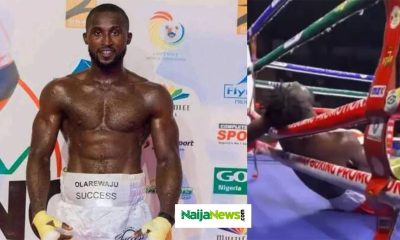
 metro2 days ago
metro2 days agoAutopsy reveals cause of Nigerian boxer death during fight in Ghana
-

 Entertainment2 days ago
Entertainment2 days agoA colleague raped me, Actress Lolo 1 alleges
-

 metro2 days ago
metro2 days agoScavenger killed, many injured as military grenade explodes in Lagos
-

 Sports2 days ago
Sports2 days agoWife of Manchester United goalkeeper, Onana, robbed of £62,000 handbag, Rolex
-

 metro22 hours ago
metro22 hours agoNurse leaves US, seeks new life in Nigeria, says everything not money
-
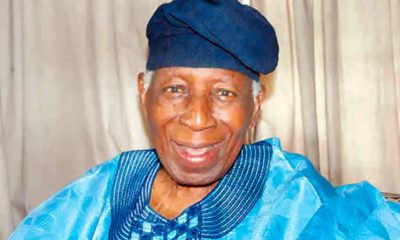
 metro1 day ago
metro1 day agoBreaking: Former Oyo governor Olunloyo dies at 89
-

 International2 days ago
International2 days agoTrump: VOA goes off air in Nigeria, Ghana, others

